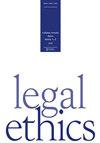‘He was wearing street clothes, not pyjamas’: common mistakes in lawyers’ assessment of legal capacity for vulnerable older clients
IF 0.3
Q1 LAW
引用次数: 4
Abstract
ABSTRACT Lawyers are increasingly called upon to deal with older clients and have ethical responsibilities to attest to their capacity for legal decision-making. As witnesses to enduring documents, the making of wills and other significant advance planning transactions, lawyers play a role in preventing elder abuse and in upholding the rights of older people. To date however, there has been very little empirical research examining how lawyers assess an older person’s legal decision-making capacity. This article presents research examining three years of capacity complaints made to the New South Wales Office of Legal Services Commissioner. Four case studies from the complaint files expose some common failings in the way that lawyers interact with older clients who have experienced cognitive impairment. The process of capacity assessment is viewed through the theoretical lens of vulnerability to highlight how the actions of lawyers and regulators can exacerbate the inherent and situational vulnerability of older people with a cognitive impairment. The author argues that improvements in capacity guidelines, legal education and robust enforcement of ethical rules are required to safeguard the rights of older clients and help prevent abuse. The findings will have implications for lawyers and regulators everywhere dealing with an ageing population.“他穿着便服,没穿睡衣”:律师在评估弱势老年客户的法律行为能力时常犯的错误
越来越多的律师被要求与老年客户打交道,并有道德责任证明他们的法律决策能力。律师作为持久文件、立遗嘱和其他重大预先规划交易的证人,在防止虐待老年人和维护老年人权利方面发挥着作用。然而,迄今为止,很少有实证研究调查律师如何评估老年人的法律决策能力。本文提出了研究审查三年的能力投诉作出了法律服务专员新南威尔士州办公室。投诉文件中的四个案例研究揭示了律师在与有认知障碍的老年客户互动时的一些常见失误。通过脆弱性的理论视角来看待能力评估的过程,以强调律师和监管机构的行为如何加剧认知障碍老年人固有的和情境的脆弱性。作者认为,需要改进能力指导方针、法律教育和强有力地执行道德规则,以保障老年客户的权利并帮助防止虐待。这些发现将对各地处理人口老龄化问题的律师和监管机构产生影响。
本文章由计算机程序翻译,如有差异,请以英文原文为准。
求助全文
约1分钟内获得全文
求助全文

 求助内容:
求助内容: 应助结果提醒方式:
应助结果提醒方式:


